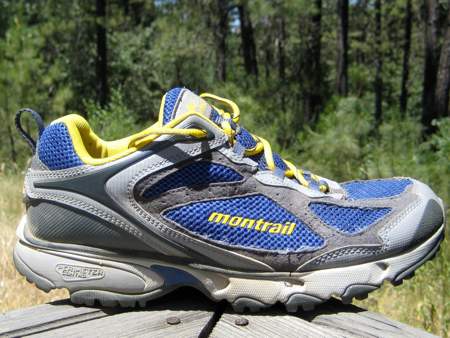Our Favorite Trail Running Shoes
To learn about our current favorite trail running shoes, check out our Best Trail Running Shoes article.
Montrail Sabino Trail Review
 The Montrail Sabino Trail comes out of Montrail’s Hardrock lineage. While there are many similarities between the Sabino Trail and the Hardrock, enough that we frequently compare the two in the following review, Montrail made enough changes to the Hardrock that it was no longer comfortable continuing to call the shoe “Hardrock.” That’s understandable as the Sabino Trail is a significantly lower, lighter, more breathable shoe than the Hardrock was. Basically with the Sabino Trail, Montrail took the best of the Hardrock and recreated the concept while acknowledging the long term trend in trail shoes that less is more.
The Montrail Sabino Trail comes out of Montrail’s Hardrock lineage. While there are many similarities between the Sabino Trail and the Hardrock, enough that we frequently compare the two in the following review, Montrail made enough changes to the Hardrock that it was no longer comfortable continuing to call the shoe “Hardrock.” That’s understandable as the Sabino Trail is a significantly lower, lighter, more breathable shoe than the Hardrock was. Basically with the Sabino Trail, Montrail took the best of the Hardrock and recreated the concept while acknowledging the long term trend in trail shoes that less is more.
If you prefer to read reviews rather than watch them, jump ahead for a text summary.
Montrail Sabino Trail
Intro
Montrail has replaced the Hardrock line with the Sabino Trail. The Sabino Trail still provides significant protection and support, but in a much lighter package. The Sabino Trail weighs in at 12.8 ounces for a men’s size 9, while a women’s 7 comes in at 10.25 ounces.
Please note that the Sabino Trail runs a 1/2 larger than other trail shoes, so make sure to buy a 1/2 size smaller than usual! Even with the proper lengthy, this shoe tends to work best for folks with wider feet.
In this review, we’ll take a separate look at the Sabino Trails’s outsole, midsole, and upper before wrapping up with a conclusion.

Outsole
The Sabino Trail’s outsole is very similar to that of the Hardrock. One noteworthy feature is that the outsole contains zones of highly differentiated lugs each with a specific purpose.
The perimeter of the outsole is ringed with clusters of square nubs in an irregular pattern. These nubs provide great traction on a variety of surfaces.
The interior portions of the outsole are filled with horizontal and vertical linear lugs. Toward the forefoot, the horizontal lugs are oriented to provide foreword oriented traction in toe-off. Conversely, the rearward horizontal lugs are oriented in the opposite direction to keep the heel from sliding forward when heel-planting. The vertically-oriented right and left facing lugs provide sideward traction.
Like the Hardrock, there’s a significant cutout in the midfoot. This provides extra traction on very loose terrain. However, this area also tends to hold a good deal of mud. Thankfully, the cutout is smaller in the Sabino Trail than in the Hardrock, so you get the traction benefits without collecting as much mud.
The rear of the outsole has a significant flex point as well as three rows of beefy linear lugs. All of these provide excellent heel grip.
The Sabino Trail’s forefoot has three significant flex grooves whereas the original Hardrock and Hardrock 08 had four. That said, no flexibility seems to have been lost.
Midsole and Rockplate
The Sabino Trail has a dual density midsole. Both the forefoot and heel have cushy foam for a comfortable ride. The midfoot has a significant post, although it is reduced from both the Hardrock and Hardrock 08’s post.
As you’d expect from the Hardrock’s successor, there’s a rock plate that runs the full length of the shoe. There’s a bunch of protection in this shoe. That’s something you don’t see a whole lot of these days.
The heel is 19 mm tall with a 9 mm height at the toe, so there’s a 10 mm drop.
Upper
This is where many of the weight savings over the original Hardrock come into play. That’s a good thing when you consider that the Hardrock weighed in at close to 15 ounces.
Much of the upper is open-cell mesh that’s lightweight and let’s your foot breathe even in hot and humid conditions. A faux suede cradle that ties in with the laces locks your forefoot in place.
The toe box is quite wide which allows your toes to really spread out. The toe box isn’t overly tall, but given the width, there’s plenty of space.
Montrail created a robust toe bumper by extending both the midsole and outsole over the upper on the apex at the front of the shoe. That apex toe bumper is, however, fairly narrow. While there is additional protection to outside of the apex bumper, it is only a reinforced overlay. This overlay is enough to provide some push through protection, but will not be enough to save your toes from a full frontal assault on a rock.
The Sabino Trail has a significant heel cup with exterior reinforcement. This is beefier than on most trail shoes. The heel pocket is on the narrower side of things, but it should fit larger volume heels.
The ankle collar is well-padded and on par with many other trail shoes. The tongue is gusseted to help keep debris out of the shoe. The insole is fully removable.
The Conclusion
The Sabino Trail is a highly protective, highly supportive ultra-long-distance trail running shoe in a relatively light weight package. This type of shoe is a rarity on the market these days and the Sabino Trail fills this niche admirably.
Availability
![]() If you want to pick up the Sabino Trail, both the men’s and women’s version are currently available from the Wilderness Running Company. As an iRunFar reader, we can now hook you up with 10% off all Wilderness Running Company orders. Just enter the code iRunFar10 at checkout. You’ll also get free shipping AND help support iRunFar.com. It’s a win-win-win!
If you want to pick up the Sabino Trail, both the men’s and women’s version are currently available from the Wilderness Running Company. As an iRunFar reader, we can now hook you up with 10% off all Wilderness Running Company orders. Just enter the code iRunFar10 at checkout. You’ll also get free shipping AND help support iRunFar.com. It’s a win-win-win!
Call for Comments/Questions
If you’ve worn the Sabino Trail, let us know what you think in a comment. If you’ve got any questions, ask away and we’ll do our best to answer them.
[Video by Travis Liles, who also publishes RunTheUltras.com, with text adaptation and additional commentary by Bryon Powell.]
[Disclosure: iRunFar is a Wilderness Running Company affiliate, so your purchase of the Sabino Trail through the links above helps support iRunFar. Montrail provided both Travis Liles and Bryon Powell with samples of the Sabino Trail to review.]




